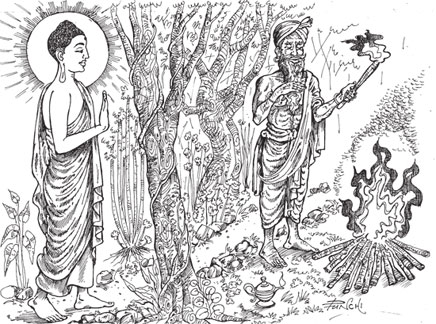|
Vasala Sutta:
What makes one an outcast?
By Premasara EPASINGHE
In ancient India, even during the time of the Gautama Buddha, the
caste system prevailed in a big way. The four main castes were
Kshatriya, Brahmana, Suddra and Vaisrave. The blue-blooded, especially
the Kshatriyas (Royalty) and the Brahmanas thought they were superior to
others. Therefore, they dominated society and treated all others as
outcasts.
The outcasts were expelled from society and were not considered as
respectable men or women even to associate with.
 The outcasts (Vasala) were treated badly and were not recognised in
the social structure of India at that time. They were not given equal
opportunities. They were not allowed to read the Vedas or Manthrams.
They worked like slaves and were ill-treated by the ‘Super Classes’, the
kings, nobles and Brahmins. The outcasts (Vasala) were treated badly and were not recognised in
the social structure of India at that time. They were not given equal
opportunities. They were not allowed to read the Vedas or Manthrams.
They worked like slaves and were ill-treated by the ‘Super Classes’, the
kings, nobles and Brahmins.
The Buddha was a great revolutionary. He never cared for caste, creed
or colour. For Him, everyone born in the world were equal. He was
undoubtedly the greatest social reformer of the world.
Born to a royal family, the Buddha treated everyone equally. This
shows clearly the greatness of the Buddha. He fought for the
downtrodden. He always stood for fair play and justice.
In the Aggikabharadvaja Sutta or Vasala Sutta, we see the Buddha in
the proper perspective. In ancient India there were many kinds of
religious beliefs and practices, and some worshipped the Sun, wind and
other elements of nature. A very popular ritual was the ‘Fire
Sacrifices’.
Fire sacrifice
One day, when the Enlightened One was on His way, begging for alms in
Savatthi, a Brahmin known as Aggikabharadvaja had began his usual fire
sacrifice.
Through sheer ignorance, haughtiness and pride, Aggikabharadvaja,
seeing the Buddha at a distance, addressed the Blessed One, in an
insulting manner.
The Blessed One never got upset. He had dealt with more ‘difficult
customers’ such as Alavaka. He was calm and remained cool and serene.
The Buddha questioned him, “Aggikabharadvaja, do you know what makes a
man or woman an outcast?” He could not answer the question. Then through
compassion to the Brahmin, the Buddha explained the conditions that
makes one an outcast and preached the Vasala Sutta.
|
Adhi Poya on August 31
 August 2012 is a rare month when there are 13 Full Moon Poya days
instead of the usual 12. On August 1 we observed Nikini Poya while the
31st would be known as Adhi Binara Poya. On September 29 we would
observe Binara Poya. August 2012 is a rare month when there are 13 Full Moon Poya days
instead of the usual 12. On August 1 we observed Nikini Poya while the
31st would be known as Adhi Binara Poya. On September 29 we would
observe Binara Poya.
When a month has two Full Moon Poya days, the second would be known
as an Adhi Poya. The extra poya day is inserted into the Buddhist lunar
calendar to ensure that it stays in sync with the western (solar)
calendar. When this happens, there is a Full Moon Poya at the beginning
of a month and another at the end.
This phenomenon occurs every two-and-a-half to three years when an
extra lunar month known as Adhi Masa (the lunar month in which the extra
poya takes place) happens. This occurs due to the difference in a mean
solar month (30 days) and a lunar month (about 28/29.5 solar days).
It has been found that an Adhi Masa begins and ends with the Sun
having the same zodiacal sign. |
Out of 29 Suttas in the Pirith Poth Vahanse, the holy book of
protection, 12 are categorised and extracted in the Kuddhaka Sutta. The
Vasala Sutta also belongs to the Kuddhaka Sutta. There are 24 stanzas or
verses in the Vasala Sutta.
Grumbling
Vasala Sutta begins with the stanza:
Kodhano, Upanachi (Possessing anger and grumbling)
Papamakkhi Ca, Yo Naro (If a man [Naro] is evil and hypocritical)
Vi Pannaditthi Mayavi (Failing in [right] vision, deceitful)
Tam Janna Vasalo Iti (Know him as an outcast).
Even in all the other 23 stanzas, the last line reads thus ‘Tam Janna
Vasalo Iti’ (Know him as an outcast).
The words uttered by the Buddha stand strong even today as a
universal truth. No other religious leader or philosopher has directed
their philosophies and given advice for the betterment of mankind than
the Samma Sambuddha – Great master and Exalted and Enlightened One.
Therefore, the Buddha is the most outstanding and compassionate
religious leader. He was the greatest social reformer.
What are the qualities of an outcast embodied in the Vasala Sutta?
An outcast is a man who hurts living beings and he has no love to
others, besieges villagers and suburbs as an agitator.
An outcast is a thief, a cheat, a killer, a man of untruth, one who
commits adultery, does not look after his beloved parents, a
foul-mouthed and harmful person and a man after doing an evil deed
desires it not be known, an ungrateful person, who eats food from other
homes and when it comes to his turn does not even look at the others.
An outcast is a deceiver through falsehood, utters bad language and
does not provide food for others, praises his own self, angry, stingy,
desirous of evil, avaricious, crafty, shameless, unscrupulous, a man who
reviles the Buddha or His disciples, a person who shows a worthy one
(Arahat) without being a worthy one. These are the main qualities of an
outcast.
Low caste
The Buddha uttered that you cannot categorise a man or woman as an
outcast, because of him/her being born to a low caste.
In the Vasala Sutta, stanza number 21 and stanza number 24 (a
repetition of stanza number 21) are very important. They are stanzas
that most Buddhists have memorised, uttering them very often, and they
sum up the entire Vasala Sutta. The crux of the Vasala Sutta is embodied
in this stanza.
 |
|
Savatthi in India where
the Buddha preached the Vasala Sutta |
Na Jacca Vasalo Hoti
(By birth is one not an outcast)
Na Jacca Hoti, Brahmano
(By birth is not one a Brahmana)
Kammana Vasalo Hoti
(By action is one an outcast)
Kammana Hoti Brahamano
(By action is one a Brahmana).
The Buddha laid much emphasis on passing the strong message to the
Brahmanas, an elite class, who used to run down and insult scavengers,
coolies and labourers. The Blessed One never discriminated against
anyone. He always valued good meritorious actions.
To prove this point the Buddha explained in the Vasala Sutta that a
son of an outcast named Sopaka reached the highest fame (Matanga),
freeing himself from passion. He gave up desire and passion. The Buddha,
in concluding the Vasala Sutta, said if a man who performs evil action,
in this world as well as beyond it, suffer in both worlds.
The Buddha was the most pleasant and powerful communicator that the
world has ever seen. At the end of listening to the Vasala Sutta, the
Brahmana Aggikabharadvaja became a great devotee of the Gauthama Buddha.
|


